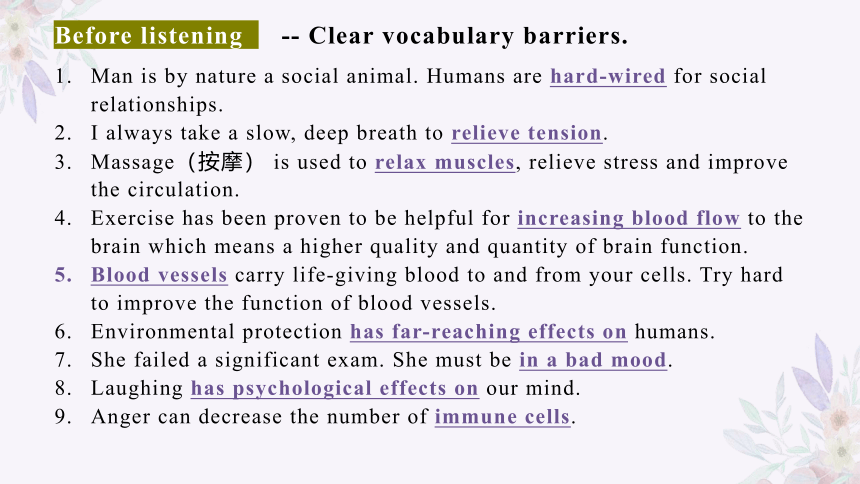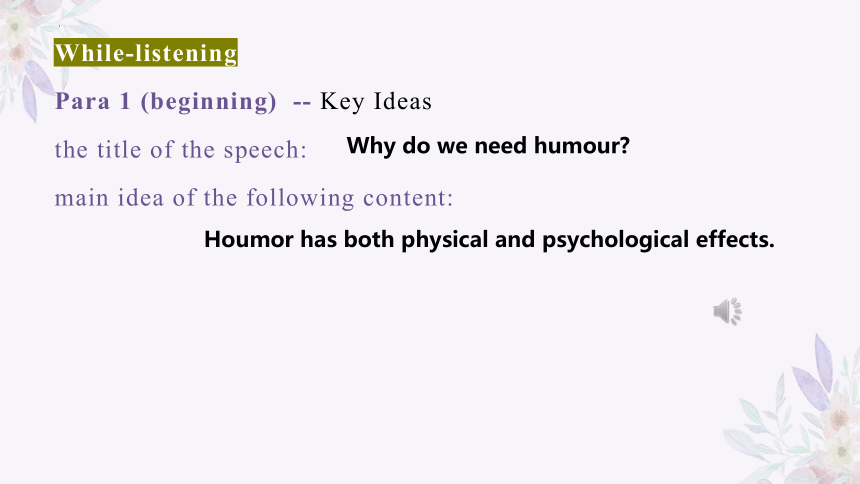北师大版(2019)选择性必修第二册 Unit 4 Humour Lesson 2 Why Do We Need Humour?课件(共13张PPT,内镶嵌音频)
文档属性
| 名称 | 北师大版(2019)选择性必修第二册 Unit 4 Humour Lesson 2 Why Do We Need Humour?课件(共13张PPT,内镶嵌音频) |

|
|
| 格式 | pptx | ||
| 文件大小 | 4.9MB | ||
| 资源类型 | 教案 | ||
| 版本资源 | 北师大版(2019) | ||
| 科目 | 英语 | ||
| 更新时间 | 2023-08-18 14:40:46 | ||
图片预览






文档简介
(共13张PPT)
L2 Why do we need humour
Unit 4
Why do we need humour
Brainstorm:
What’s your the type of the speech (narrative, argument, exposition)
What kind of structure will this type of text use What about the language features
From what aspects will the author develop the text
Why do we need humour
speech
(argument)
structure
language features
persuasive/
convincing
logical
interactive
Before listening -- Clear vocabulary barriers.
Man is by nature a social animal. Humans are hard-wired for social relationships.
I always take a slow, deep breath to relieve tension.
Massage(按摩) is used to relax muscles, relieve stress and improve the circulation.
Exercise has been proven to be helpful for increasing blood flow to the brain which means a higher quality and quantity of brain function.
Blood vessels carry life-giving blood to and from your cells. Try hard to improve the function of blood vessels.
Environmental protection has far-reaching effects on humans.
She failed a significant exam. She must be in a bad mood.
Laughing has psychological effects on our mind.
Anger can decrease the number of immune cells.
While-listening
Para 1 (beginning) -- Key Ideas
the title of the speech:
main idea of the following content:
Why do we need humour
Houmor has both physical and psychological effects.
While-listening
Para 2 (Body) -- physical effects
Linking words Main points Details
______ Helps _____________________. It ___________in our body and the effects can be felt for as long as _____ minutes after a good laugh.
______ increases _________ to the heart and __________________ of blood vessels.
... helps protect us from
.
______ the level of stress chemicals in our body ________and the number of immunce cells in our body _______. better able to fight .
Firstly
Also
Finally
relieve tension
relaxes the muscles
45
the blood flow
improves the function
heart disease
falls
increases
infection
How to sort out the key information.
bullet points
table/
diagram
Para 3 (Body) -- sort out the psychological effects of humour on our mind.
Scientists have proved that there is a two-way effect between smiling and mood.
When we incorporate humour as part of our life attitude, it can have far-reaching effects.
It means that it will have a great influence on how we live. If we are in a bad mood, we are likely to express negative attitudes and feelings; and this makes those around us down, too. But if we always try to be positive and funny, people will enjoy our company and feel energised.
When we’re happy we naturally smile.
When we smile, even if we don’t feel like it, it can also make us feel happy.
1
2
3
4
From what aspects does the speaker illustrate the psychological effects (1.... 2....)
While-listening
Para 4 (ending)
conclusion+thanks
The Top Characteristics Of A Good Speech
Clear Message And Key Ideas (at the start)
Impactful Oral Delivery (keep audience involved--examples; stories)
Informative, But Not Repetitive (relevant, critical and helpful information)
Powerful Nonverbal Cues(body language; eye contact; facial expressions; voice)
Using Questions to Draw Attention
Some speakers use questions from time to time to draw the audience’s attention. Then they provide answers to the questions. In this way, it helps the audience to understand the points they are making. Listen carefully to the questions and focus on the answers.
Post-listening
What can humour do for us According to recent research, humour has both physical and psychological effects.
Does it mean there is a relation between smiling and mood
The answer is YES.
What does “far-reaching effects” mean
It means that it will have a great influence on how we live.
Q&A
Elaborating with Examples
1. One of the example of this is that you can use humour to get people to laugh at you.
2. For instance, if you accidentally pour coffee all over yourself, you can laugh at yourself or make a joke about it.
3. You can say, for example, “My T-shirt also wants to have a cup of coffee.”
Prepare a speech entitled “The benefits of humour” (80 words)
The following aspects should be included in your speech :
1. Your own experience
2. An example
3. Your understanding of humour
Homework
L2 Why do we need humour
Unit 4
Why do we need humour
Brainstorm:
What’s your the type of the speech (narrative, argument, exposition)
What kind of structure will this type of text use What about the language features
From what aspects will the author develop the text
Why do we need humour
speech
(argument)
structure
language features
persuasive/
convincing
logical
interactive
Before listening -- Clear vocabulary barriers.
Man is by nature a social animal. Humans are hard-wired for social relationships.
I always take a slow, deep breath to relieve tension.
Massage(按摩) is used to relax muscles, relieve stress and improve the circulation.
Exercise has been proven to be helpful for increasing blood flow to the brain which means a higher quality and quantity of brain function.
Blood vessels carry life-giving blood to and from your cells. Try hard to improve the function of blood vessels.
Environmental protection has far-reaching effects on humans.
She failed a significant exam. She must be in a bad mood.
Laughing has psychological effects on our mind.
Anger can decrease the number of immune cells.
While-listening
Para 1 (beginning) -- Key Ideas
the title of the speech:
main idea of the following content:
Why do we need humour
Houmor has both physical and psychological effects.
While-listening
Para 2 (Body) -- physical effects
Linking words Main points Details
______ Helps _____________________. It ___________in our body and the effects can be felt for as long as _____ minutes after a good laugh.
______ increases _________ to the heart and __________________ of blood vessels.
... helps protect us from
.
______ the level of stress chemicals in our body ________and the number of immunce cells in our body _______. better able to fight .
Firstly
Also
Finally
relieve tension
relaxes the muscles
45
the blood flow
improves the function
heart disease
falls
increases
infection
How to sort out the key information.
bullet points
table/
diagram
Para 3 (Body) -- sort out the psychological effects of humour on our mind.
Scientists have proved that there is a two-way effect between smiling and mood.
When we incorporate humour as part of our life attitude, it can have far-reaching effects.
It means that it will have a great influence on how we live. If we are in a bad mood, we are likely to express negative attitudes and feelings; and this makes those around us down, too. But if we always try to be positive and funny, people will enjoy our company and feel energised.
When we’re happy we naturally smile.
When we smile, even if we don’t feel like it, it can also make us feel happy.
1
2
3
4
From what aspects does the speaker illustrate the psychological effects (1.... 2....)
While-listening
Para 4 (ending)
conclusion+thanks
The Top Characteristics Of A Good Speech
Clear Message And Key Ideas (at the start)
Impactful Oral Delivery (keep audience involved--examples; stories)
Informative, But Not Repetitive (relevant, critical and helpful information)
Powerful Nonverbal Cues(body language; eye contact; facial expressions; voice)
Using Questions to Draw Attention
Some speakers use questions from time to time to draw the audience’s attention. Then they provide answers to the questions. In this way, it helps the audience to understand the points they are making. Listen carefully to the questions and focus on the answers.
Post-listening
What can humour do for us According to recent research, humour has both physical and psychological effects.
Does it mean there is a relation between smiling and mood
The answer is YES.
What does “far-reaching effects” mean
It means that it will have a great influence on how we live.
Q&A
Elaborating with Examples
1. One of the example of this is that you can use humour to get people to laugh at you.
2. For instance, if you accidentally pour coffee all over yourself, you can laugh at yourself or make a joke about it.
3. You can say, for example, “My T-shirt also wants to have a cup of coffee.”
Prepare a speech entitled “The benefits of humour” (80 words)
The following aspects should be included in your speech :
1. Your own experience
2. An example
3. Your understanding of humour
Homework
同课章节目录
- Unit 4 Humour
- Lesson 1 What’s So Funny?
- Lesson 2 Why Do We Need Humour?
- Lesson 3 My Favourite Comedian
- Unit 5 Education
- Lesson 1 Enlightening a Mind
- Lesson 2 The Objectives of Education
- Lesson 3 Understanding
- Unit 6 The Media
- Lesson 1 From Page to Screen
- Lesson 2 Questions about Media
- Lesson 3 The Advertising Game
